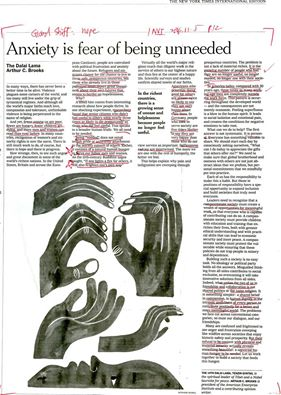Anxiety is fear of being unneeded
Dalai Lama and Arthur Brooks, The New York Times, NOV 4, 2016
accessed NOV 10, 2016
達賴喇嘛 和 美國華府 中央偏右的智庫"美國企業研究院"院長Arthur Brooks 合寫這篇評論,登在2016年11月4日紐約時報。
- 他們問:為何美國事移民者的天堂,而美國人自己充滿焦慮/不快樂?
- 答案是:美國人覺得不被他人需要。
- 他們進一步說:服務他人(有益眾生)是我們天生的人性。這種天生的人性超出了因服務他人所帶來的名譽、利益、權力以滿足我們的自私和驕傲。他們引述了許多科學和統計地研究,說明服務他人(有益眾生)使得我們快樂而長壽。
- 美國企業研究院是我1987-1995擔任亞洲研究部副主任和專任學者的地方。也是 "新保守主義"的大本營。一般人會聯想到雷根和老布希總統的政策和由研究院出任的重要官員。這和心靈為上的達賴喇嘛似乎風馬牛不相及。
- Arthur Brooks曾在芝加哥大學任教,專門研究 "慈善事業"。
- 不只全球政治國際關係圖像在轉變。人類的價值觀也在轉換。世界逐漸邁入新紀元。
林中斌 2016.11.10
His Holiness Dalai Lama and the President of American Enterprise Institute Arthur Brooks coauthored the interesting and enlightening piece published in the November 4, 2016 New York Times.
- I served in the center-right think tank during 1987-1995 as Associate Director of Asian Studies and Resident Scholar before Author Brooks arrived whom I met in Taipei a few years ago when the outgoing president Chris DeMuth introduced Brooks to friends in Taipei.
- Why would the bastion of conservatism and even "neo-conservatism" in the U.S., perceived to be connected with American "imperialism", get involved with the world's foremost spiritual leader?
- What is emerging are new values, new types of national leaders, and new geopolitical configuration. The world is entering a New Age.
Chong-Pin Lin Nov. 10. 2016


In many ways, there has never been a better time to be alive. Violence plagues some corners of the world, and too many still live under the grip of tyrannical regimes. And although all the world’s major faiths teach love, compassion and tolerance, unthinkable violence is being perpetrated in the name of religion.
And yet, fewer among us are poor, fewer are hungry, fewer children are dying, and more men and women can read than ever before. In many countries, recognition of women’s and minority rights is now the norm. There is still much work to do, of course, but there is hope and there is progress.
How strange, then, to see such anger and great discontent in some of the world’s richest nations. In the United States, Britain and across the European Continent, people are convulsed with political frustration and anxiety about the future. Refugees and migrants clamor for the chance to live in these safe, prosperous countries, but those who already live in those promised lands report great uneasiness about their own futures that seems to border on hopelessness.
Why?
A small hint comes from interesting research about how people thrive. In one shocking experiment, researchers found that senior citizens who didn’t feel useful to others were nearly three times as likely to die prematurely as those who did feel useful. This speaks to a broader human truth: We all need to be needed.
Being “needed” does not entail selfish pride or unhealthy attachment to the worldly esteem of others. Rather, it consists of a natural human hunger to serve our fellow men and women. As the 13th-century Buddhist sages taught, “If one lights a fire for others, it will also brighten one’s own way.”
Virtually all the world’s major religions teach that diligent work in the service of others is our highest nature and thus lies at the center of a happy life. Scientific surveys and studies confirm shared tenets of our faiths. Americans who prioritize doing good for others are almost twice as likely to say they are very happy about their lives. In Germany, people who seek to serve society are five times likelier to say they are very happy than those who do not view service as important. Selflessness and joy are intertwined. The more we are one with the rest of humanity, the better we feel.
This helps explain why pain and indignation are sweeping through prosperous countries. The problem is not a lack of material riches. It is the growing number of people who feel they are no longer useful, no longer needed, no longer one with their societies.
In America today, compared with 50 years ago, three times as many working-age men are completely outside the work force. This pattern is occurring throughout the developed world — and the consequences are not merely economic. Feeling superfluous is a blow to the human spirit. It leads to social isolation and emotional pain, and creates the conditions for negative emotions to take root.
What can we do to help? The first answer is not systematic. It is personal. Everyone has something valuable to share. We should start each day by consciously asking ourselves, “What can I do today to appreciate the gifts that others offer me?” We need to make sure that global brotherhood and oneness with others are not just abstract ideas that we profess, but personal commitments that we mindfully put into practice.
Each of us has the responsibility to make this a habit. But those in positions of responsibility have a special opportunity to expand inclusion and build societies that truly need everyone.
Leaders need to recognize that a compassionate society must create a wealth of opportunities for meaningful work, so that everyone who is capable of contributing can do so. A compassionate society must provide children with education and training that enriches their lives, both with greater ethical understanding and with practical skills that can lead to economic security and inner peace. A compassionate society must protect the vulnerable while ensuring that these policies do not trap people in misery and dependence.
Building such a society is no easy task. No ideology or political party holds all the answers. Misguided thinking from all sides contributes to social exclusion, so overcoming it will take innovative solutions from all sides. Indeed, what unites the two of us in friendship and collaboration is not shared politics or the same religion. It is something simpler: a shared belief in compassion, in human dignity, in the intrinsic usefulness of every person to contribute positively for a better and more meaningful world. The problems we face cut across conventional categories; so must our dialogue, and our friendships.
Many are confused and frightened to see anger and frustration sweeping like wildfire across societies that enjoy historic safety and prosperity. But their refusal to be content with physical and material security actually reveals something beautiful: a universal human hunger to be needed. Let us work together to build a society that feeds this hunger.


 留言列表
留言列表


